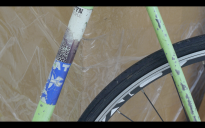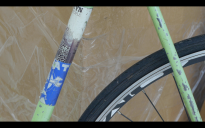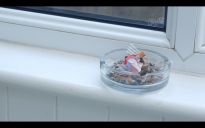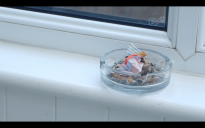
-
I'm talking nonsense, ignore me, sorry.
-
2048x864 is the correct setting for shooting with a 1.33x anamorphic adapter. To produce square pixels with normal, spherical lenses, you'd want to set MJPEG frame size to 2048x1152.
-
@lpowell Just out of interest is there any point pushing the resolution higher than that ?
-
@Stray I doubt there's much value in going beyond 2048x1152. There's a limit to how much bitrate you can pump into the MJPEG encoder, and the more pixels you squeeze into each frame, the coarser the compression becomes. In my MJPEG patch, I was able to boost the bitrate up to 100Mbps with complete reliability on 30MB/sec Class 10 SD cards. It started to get finicky at higher bitrates, and its low-light performance wasn't as consistent, so I concluded 100Mbps was a healthy target bitrate.
-
@LPowell When I first got my GH2 4 months ago the first thing I looked at was MJPEG in low light and in all truth I liked its relative performance compared to the other patch I was using at the time which was I think was Sanity. I have been on an obsessive learning curve since then so I have abetter idea about what I'm looking at. One of the things I continue to notice across all AVCHD patches is the starvation of data in low luma situations. Is this also a property of MJPEG. Does JPEG apply a perceptual compression technique related to luminance? Is the MJPEG constant quality or is it CBR.
Was it also resolved whether the MJPEG was 4:2:2 sampled or 4:2:0.
I can see from the Flat 4 thread that there is a hunger for specialist patches even with their limitations. So what sort of subject matter favours MJPEG over AVCHD at the same bitrates?
-
I adjusted an old GF1 to shoot MJPEG at 90 mbit/s, and it is picking hues with ease. Certainly feels like 4:2:2. There is an elevated noise floor that kicks in at certain luma level and reduces useful dynamic range quite severely, though. Using contrast flattening lens filtration helped.
-
Stop posting strange things.
-
Topic renamed, moved to offtopic.
Changing MJPEG to big size values bring no added values, as serious guys made serious test long time ago.
-
@vicx The GH1 MJPEG encoder could be patched to record in 4:2:2 color, but the GH2 will work properly only in 4:2:0 color depth. Both MJPEG and AVCHD are VBR encoders and will naturally reduce their bitrates when underexposed, since there is less light in dimly lit scenes to record. What's important, however, is not the bitrate, but how finely the MJPEG and AVCHD frames are quantized and encoded.
With the MJPEG patch in Flow Motion v2, I was able to maintain bitrates close to 100Mbps at very dim exposures. As illumination dims, the encoder uses finer quantizing factors, until it reaches quality levels comparable to Photoshop JPEG images saved at maximum quality.
The AVCHD patch in Flow Motion v2 is designed to maintain consistent motion picture quality over a wide range of exposure levels. Since it is a short-GOP, B-frame encoder, it does not need as much bitrate to maintain maximum image quality at low light levels as the MJPEG all-Intra encoder.
Typically, both MJPEG and AVCHD encoders will operate near 100Mbps peak in well-exposed scenes. As exposure levels dim, the AVCHD encoder's bitrate will drop while it maintains consistent quality levels. The MJPEG encoder's bitrate will remain high, as it will actually increase its image quality at dimmer exposure levels.
-
In other words, it may eat the GH3's lunch. For now.
-
In other words, it may eat the GH3's lunch. For now.
Yeah, just as long as it's not raining. :)
-
if you post screenshots again, use a software like media player classic or vlc to take them, because your posted ones are cropped to 1920x1080. not your 2.5k resolution.
-
Hello post! Here is my test. Shot and edited in 2K, rendered in 1080p. I played with levels a bit.
-
Look at this test. Camera was locked on a tripod, exact same lens, distance. If you study closely 2k vs 24p you will see that 2k shot has slightly bigger frame than 24p. This means that it's not upscaled 1080p!

 2ka.png1280 x 800 - 1M
2ka.png1280 x 800 - 1M
 24pa.png1280 x 800 - 1M
24pa.png1280 x 800 - 1M
 2kb.png1280 x 800 - 1M
2kb.png1280 x 800 - 1M
 24b.png1280 x 800 - 1003K
24b.png1280 x 800 - 1003K -
Best comment ever: "Stop posting strange things."
Howdy, Stranger!
It looks like you're new here. If you want to get involved, click one of these buttons!
Categories
- Topics List23,992
- Blog5,725
- General and News1,354
- Hacks and Patches1,153
- ↳ Top Settings33
- ↳ Beginners256
- ↳ Archives402
- ↳ Hacks News and Development56
- Cameras2,367
- ↳ Panasonic995
- ↳ Canon118
- ↳ Sony156
- ↳ Nikon96
- ↳ Pentax and Samsung70
- ↳ Olympus and Fujifilm101
- ↳ Compacts and Camcorders300
- ↳ Smartphones for video97
- ↳ Pro Video Cameras191
- ↳ BlackMagic and other raw cameras116
- Skill1,960
- ↳ Business and distribution66
- ↳ Preparation, scripts and legal38
- ↳ Art149
- ↳ Import, Convert, Exporting291
- ↳ Editors191
- ↳ Effects and stunts115
- ↳ Color grading197
- ↳ Sound and Music280
- ↳ Lighting96
- ↳ Software and storage tips266
- Gear5,420
- ↳ Filters, Adapters, Matte boxes344
- ↳ Lenses1,582
- ↳ Follow focus and gears93
- ↳ Sound499
- ↳ Lighting gear314
- ↳ Camera movement230
- ↳ Gimbals and copters302
- ↳ Rigs and related stuff273
- ↳ Power solutions83
- ↳ Monitors and viewfinders340
- ↳ Tripods and fluid heads139
- ↳ Storage286
- ↳ Computers and studio gear560
- ↳ VR and 3D248
- Showcase1,859
- Marketplace2,834
- Offtopic1,320









